- Home
- M. K. Hume
King Arthur: Warrior of the West: Book Two Page 12
King Arthur: Warrior of the West: Book Two Read online
Page 12
Wyrr had been fifteen when Glamdring first saw him, and the youth’s face was young, unfinished in appearance and sexually ambiguous. But, even then, Wyrr’s skin showed a fine network of lines and blue veins. Wyrr’s short stature was aggravated by swollen joints and bowed legs. From a distance, Wyrr appeared to be no older than ten years of age, but at close quarters he looked like an old man of ninety.
To add to the horrible fascination of his physical appearance, Wyrr was an albino. His skin was the luminous, fish-belly white associated with beautiful women and sickly old men. His hair was long and colourless. It was as if the gods had leached the vitality out of his tiny body before he was born, leaving behind a juiceless husk that was neither young nor old. His pale eyelashes and brows were barely visible, he grew no beard and his small nubs of milk teeth gave his face a peculiar, half-finished look.
Whenever he walked in the daylight, Wyrr was forced to shade his eyes within the shadow of a thick cloak, for his irises were the same colour as blood washed thin with water.
But if Wyrr lacked bodily strength or vigour, the gods had compensated him with superior force of will and a charismatic power that could be exerted over other, frailer minds. Doubtless, the child Wyrr would not have grown to his perversion of manhood without the temperament of a warrior and the cold cunning of an assassin. Although fate had decreed that the albino was born to be a figure of fun, Wyrr was Glamdring’s brain; he curbed the rashness and viciousness of the thane’s behaviour and replaced these flaws with a chilly intelligence. Wyrr and Glamdring, between them, made one formidable man.
Now, with fussy, childish steps, Wyrr preceded Bedwyr into the draughty, smoke-filled hall. His white robes scarcely stirred with either breath or movement. Unlike the hall and its master, the boy-man was unnaturally clean for a Saxon, as if his health depended on an enforced regimen of hygiene. Bedwyr swore the little creature wore perfumed oils, for he trailed a reek of attar and costly nard.
‘Come here, my friend, and share a cup of ale with me,’ Glamdring requested, his tone more conciliatory than the thane used with any other man or woman in the fortress. Glamdring was always careful of Wyrr’s feelings and comfort, for the albino was the thane’s most valued tool.
‘Of course, master,’ Wyrr responded, in a voice that had the thin, piping treble of a child.
‘I go to war, exactly as we planned, Wyrr. And now I need your counsel.’
‘Of course, master,’ Wyrr repeated, seating himself carefully on the cleanest bench beside Glamdring.
‘Will you throw the bones for me?’
This request, put almost humbly by the arrogant Saxon, was immediately obeyed. While Glamdring ignored Bedwyr’s silent presence, Wyrr sensed the slave’s interest, and watched the Celt under lowered, pouched eyelids with the flat scrutiny of a snake. Wyrr’s lips parted in a sweet boyish smile, rendered chilling by his darting, purple-tinted tongue.
His heart pounding with fear, Bedwyr moved the litter of puppies into a quiet corner, then swept the soiled straw into a pile on the sod floor, ready for replacement.
‘More ale, Dog,’ Glamdring ordered.
Bedwyr nodded.
When he returned, Wyrr was muttering under his breath and swaying in time to unheard rhythms. Whether the sorcerer’s trance-like state was natural or feigned, Bedwyr had no way of knowing.
Wyrr cast the bones.
His crooning rose to a high crescendo, and then stopped as if a blade had sliced through the sound. Theatrically, Wyrr’s eyes snapped open.
‘Danger is close!’ The childish voice hissed the sibilant and drew it out into a thin, chilling glissade. ‘Too close! Much too close! Beware!’
You’re a fraud, Bedwyr thought to himself. Unless you’re referring to me, you devil-spawned beast. In which case the danger to you is, I swear, much too close!
The peculiar eyes widened until the pink irises were completely surrounded with white. His indrawn breath quivered.
‘Glamdring, my brother, everything depends upon your nerve and your heart. Artor has come to kill you, and he gambles for high stakes. You must match his will. You must match the man, or he will have you at his mercy. If you would become High King, then you must act like a High King.’
‘I don’t understand, Wyrr.’ Glamdring’s words were softly spoken and, in Bedwyr’s experience, uncharacteristically cautious.
‘I see a shield wall, and a tall leader within the wall. The Saxon way! I see it, master! The waves batter against the shield wall. And if it fails, then all is lost. Fear is so thick that I can taste it. When the morning comes, the fear will be finished and the fate of Glamdring will be set, like the knife that cuts through the wall. I can see the blade, where the forest twines on its hilt. And the blade is the key. You must keep the Arden Knife close by your side.’
Glamdring recoiled in surprise. So also did Bedwyr. Both men knew of a knife with a design of trees carved deeply into a handle of bone.
‘The blade is the key?’ Glamdring repeated. ‘I own such a blade.’
‘Then keep it securely upon your person. Loosened, and free of your hand, it will strike you a killing blow.’ Wyrr collapsed in a tidy heap of white robes and hair.
Turning to Bedwyr, Glamdring issued his orders in a voice that was hoarse with urgency.
‘Dog, go to my women. I gave one of them a knife with a tree motif on the handle. Filla has it. I want it back - and I want it now! And don’t consider damaging it, Dog,’ Glamdring added with a cunning leer. ‘Nor would it be wise to bury it in my chest. It’s mine, and mine alone!’
As Bedwyr left the hall, Glamdring was already lifting the comatose Wyrr, holding him close to his breast like a beloved child, and raising a beaker of red wine to the sorcerer’s pallid lips.
As he passed through the halls leading to the women’s rooms, Bedwyr’s heart beat to the refrain: ‘It’s mine! The Arden Knife is mine! Mine! Mine!’
The blade had been taken from him when he was first captured at Castell Collen. Glamdring confiscated all the spoils of war and kept it as a curiosity. When Bedwyr had last seen the knife, it had been lying on the bench next to Glamdring’s ale cup. The slave had almost forgotten its existence during the passage of three years.
When Bedwyr finally found Filla, the woman was unwilling to relinquish her gift. However, when Bedwyr warned her bluntly that Glamdring would simply take the dagger and then kill her if she made too much fuss in his hall, Filla became silent and sulky. In Glamdring’s domain, women had no human status, being slightly below his dogs in importance but superior to his slaves. Throwing back her russet hair and sneering unattractively, Filla surrendered the knife to Bedwyr.
The knife was narrow-bladed and sharpened on both edges, and its lightness made it attractive for use by a woman. The handle was quite long, and the bone mounted in brass was heavily carved in a familiar pattern of intertwining trees. It reminded Bedwyr of his past, and the forests of Arden where he had learned to hunt as a boy. His fingers recalled every shape and decoration on the gleaming, ivory-white hilt. Glamdring claimed it as his own. Had the thane forgotten its history? Bedwyr knew that his face must show no recognition when the knife was passed back to the Saxon chief.
‘You have my knife, Dog?’ he snarled. ‘That’s a good dog. Now give it to me.’
Mentally ramming the Arden Knife into the centre of Glamdring’s chest, Bedwyr knelt and offered the dagger to his master on both open palms. The Saxon snatched it up and kicked Bedwyr away into the straw. The thane gloated over the blade for a few minutes, and then thrust it into his belt, while Wyrr watched with impassive, unholy eyes that revealed nothing of what lay behind them.
Bedwyr’s heart was heavy as he regretfully returned to his labours. If Wyrr spoke the truth, then his own hand had given a symbolic weapon back to the Saxons. Bedwyr felt his shoulders sag, and he raised the hands that had held his knife. He could have cursed their compliance aloud, had Glamdring not been within earshot.
A cold hatred over
whelmed his surging regrets.
What was a knife? It was nothing without a hand to hold it and a mind to guide its purpose.
I have the hands . . . and I have the mind, Bedwyr told himself. The knife has been mine for most of its life. The blade was made for me by my father, and my grandfather fashioned the hilt from the bone of a deer he had killed. Such a knife can never rightfully belong to a rogue like Glamdring. Wyrr’s prophecy is false, and offers the Saxons either an empty promise or trickery.
Bedwyr felt the heat of his loathing for the Saxon race rise up into his throat. If he could, he would have torn the mountains down and buried the whole cursed race. And he would find some way to strike his blow and fulfil his destiny. He would be the Arden Knife, or his heart would burst in defeat. Artor had come, and all Celts must serve his cause if they were to rid the land of the Saxon scourge.
I will not fail, Bedwyr swore silently.
His eyes dropped back to his tasks, like any obedient servant of a powerful lord.
Bedwyr understood that the west was changing, even as he slaved for Glamdring Ironfist. He could see that Wyrr dreamed of a new order where Saxons ruled the whole of Britain, and Saxon language and culture swept away the past as if other races had never existed. King Artor had accepted the challenge to fight, just as Gaheris had predicted he would, and had come to lands where the soil was poor and grain was grown only in the topsoil that collected in the narrow valleys. From the Saxon perspective, glory could be won and, perchance, a throne. The death of Artor would expedite the Saxon domination of the land of the Britons, a disaster that Bedwyr could scarcely comprehend. Bedwyr observed how eagerly every Saxon male grinned and prepared his weapons, while their children played at battle games. The fortress was stirring out of its lethargy, and stores of grain and weapons were gathered into its storehouses from the surrounding farming communities.
After his work was done, Bedwyr curled up in the straw with the large, trusting hounds.
That night, as he exercised the dogs and fetched large slabs of dried horsement to feed them, he took pains to examine the fortress and its defences with newly focused eyes. Previously, hopelessness had dimmed his perceptions, but he now had an incentive to be watchful, for Artor would need to know Caer Fyrddin intimately if he was to smash it beneath his armed heel.
More warriors than usual lay like large, untidy pelts before the fires in the forecourt. The simple, wooden barrack houses were full, and the sound of snoring rose like the sawing sound of bees - or pigs. But Redbeard had ensured that guards were watchful at the gates, and the watchtower contained two men who were dark silhouettes against the faint moonlight. Bedwyr was stopped several times as he wandered, and was asked why he was abroad. He was cuffed around the head when he tried to explain himself.
He also noted that many sides of dried meat were hung in underground storerooms, along with sealed sacks of grain, wax-sealed pots of honey and fermented beer. The Romans had ensured that deep wells guaranteed plentiful water for the defenders, and the hillsides were honeycombed with rooms used for storage. As Bedwyr collected the horsemeat for the dogs, his sharp eyes missed little of his surroundings and nothing of the preparations taking place around him.
Artor had come. The night wind sang his name, and Bedwyr hugged his cold body and even colder heart with a bursting joy that was difficult to disguise. The Cornovii knew that the end of his long captivity was nigh.
Outside, around the fires, a man sang tunefully of a shield maiden called Rowan who had been turned into a fair tree when her husband was killed. The song was sweet and sad and, for a moment, Bedwyr was touched by the poetry that could live and bloom in the heart of Saxon life.
Then he thrust such blasphemy aside, and brooded on his hatred. Although the Arden Knife lay close against the Saxon thane’s skin, Bedwyr still owned it - steel and bone and twining trees - and now both he and his weapon thirsted for blood.
Several days later, on a brazen day when the sun burst through the cloud cover and changed the colour of the landscape to the sheen of hard metal, Artor came to a river that pumped its lifeblood into the ocean. The Celts made camp on its banks, with the pewter sea behind them.
‘We have reached the end of our journey,’ Artor declared to Myrddion. ‘Here we shall fight the battle that will decide our separate fates.’
Myrddion surveyed the sloping land that was thick with rank grass and soft with water.
‘It’s lousy terrain, Artor, but what can I say to you? You can see the perils for yourself. Your plan is audacious, and I doubt that I would have the nerve to carry it through. But, if it works as you expect, then the Saxons will be encircled in a band of iron. There’ll be no escape for them.’ Myrddion frowned, and stared at his narrow hands.
‘But if I fail, the Saxons will pick us off piecemeal,’ Artor finished for him.
‘You’re the one who must choose your ground, my lord,’ Myrddion said flatly.
Artor’s eyes surveyed the terrain that was, for the most part, treeless. A small hillock rose above the river, its grasses even more thick and sharp than where they were standing. A single, dying tree, twisted by the winter winds, was slightly offset on its own low hillock barely twelve feet above the surrounding flatlands.
‘There,’ the High King pointed. ‘The baggage train will take that high ground while our warriors defend the slopes and the firm earth below. We’ll dig pits and trenches with spikes embedded in them to guard the approaches and direct Glamdring’s warriors along the lines of attack that we want them to follow. We’ll keep fires burning at all times for fire arrows and for cauterizing wounds, for the slaughter will be terrible. You, my friend, will organize the healers and the wounded at the centre and, because we must, the bodies of the dead will be stacked before us and used to form a barrier to any final attack. Our warriors must continue to serve, even in death.’
‘Aye.’ Myrddion could see that Artor’s plan had merit. But his own healing skills would be stretched to breaking point, as would the hearts of the Celts in such numbing, difficult terrain.
‘What is the river called?’ Artor asked. ‘It isn’t deep, but it’s wide and fast flowing, and will repel any Saxons who attempt to ford it. It will be an effective ally to protect our left flank.’
‘I don’t know its name - if it ever had one.’
‘Then I name this place Mori Saxonicus - the Dead Saxon River,’ Artor stated. ‘It’s a bit awkward, but I’m not a map-maker. Nor am I a poet.’
‘I don’t care what we call it, as long as we win the battle,’ Myrddion countered.
In truth, Myrddion had decided that this campaign was as good a time as any other for him to perish, if die he must. If Artor failed, then Myrddion would be content to join his master. But if Artor was successful, and if he lived . . . well, perhaps he should then reconsider his mortality.
Myrddion relayed instructions from Artor to all the captains, and plans were put into effect to fortify the nameless knoll. While his army was still intact, Artor set both foot soldiers and cavalry to digging the trenches that he required. Selected bands of horsemen were sent into the foothills and returned dragging logs behind their beasts. A Roman redoubt was built and concealed, while lines of sharpened stakes were placed into positions that forced the attacking Saxon warriors to advance along predetermined paths. Nimble fingers were set to work weaving snares out of the long grasses, and still other horsemen were instructed to forage for rocks. A deserted village built on the foundations of a larger Roman settlement provided some brick, timber and dressed stone, and abandoned and broken roof tiles were painful additions to the bottom of trenches. The younger men, and even the camp followers, collected smooth river stones for slingshots, while a fire pit was dug and put under cover to protect it from inclement weather. Pelles examined it, grinned a gap-toothed smile and went looking for Myrddion to see if the baggage train contained enough pitch to meet his needs.
For three days the Celt forces sat in their camp by the river with the se
a at their backs. On the third night, Artor called Lot, Gawayne and Llanwith to attend him in his tent.
They came in the evening when the light still lingered, and it seemed that the long day would never be finished. In a grim parody of a celebration, they drank sweet Gallic wine and toasted Artor’s emissaries by name. Lot’s eyes were misted with tears as his son, Gaheris, was praised and the boy’s memory was saluted.
Within his own mind, Artor invoked Licia as his talisman for the coming conflict.
‘Tomorrow, our forces will divide,’ Artor began. ‘I won’t delude you, nor attempt to convince you that my plans have no element of risk. My strategy is fraught with danger. Your three columns will be operating independently and you’ll be remote from our defensive position here by the river. You must make Glamdring Ironfist’s outlying settlements bleed freely to torment him. Your task is to strike at a number of strategic locations while my forces wait for him to attack my position here beside the river. I hope Glamdring will believe that my force is diminished to the point where he can make a decisive move. When he commences his attack, you must make a speedy return and throw an encircling line round his warriors with your cavalry.’
‘My pleasure, my liege,’ Gawayne stated flatly. ‘No man will survive where my warriors strike. Do you have orders for prisoners?’

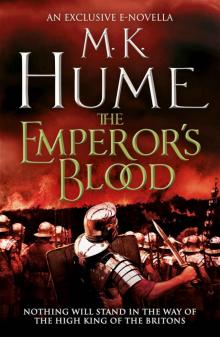 The Emperor's Blood (e-novella)
The Emperor's Blood (e-novella)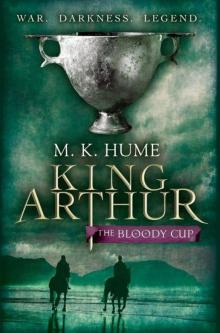 King Arthur: The Bloody Cup: Book Three
King Arthur: The Bloody Cup: Book Three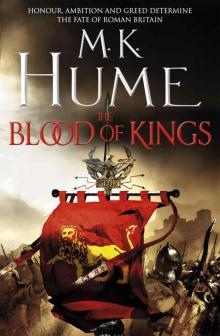 The Blood of Kings: Tintagel Book I
The Blood of Kings: Tintagel Book I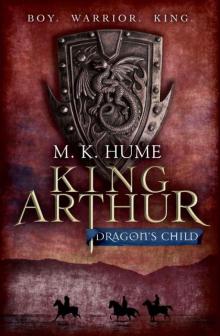 King Arthur: Dragon's Child: Book One (King Arthur Trilogy 1)
King Arthur: Dragon's Child: Book One (King Arthur Trilogy 1)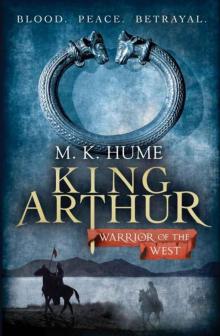 King Arthur: Warrior of the West: Book Two
King Arthur: Warrior of the West: Book Two The Storm Lord
The Storm Lord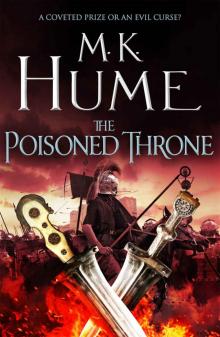 The Poisoned Throne: Tintagel Book II
The Poisoned Throne: Tintagel Book II![M. K. Hume [King Arthur Trilogy 04] The Last Dragon Read online](http://i1.bookreadfree.com/i2/04/07/m_k_hume_king_arthur_trilogy_04_the_last_dragon_preview.jpg) M. K. Hume [King Arthur Trilogy 04] The Last Dragon
M. K. Hume [King Arthur Trilogy 04] The Last Dragon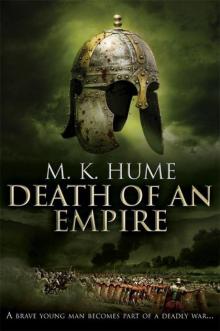 Prophecy: Death of an Empire: Book Two (Prophecy Trilogy)
Prophecy: Death of an Empire: Book Two (Prophecy Trilogy)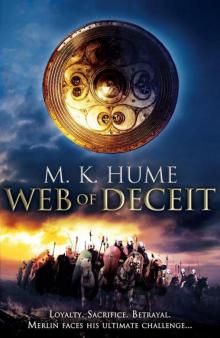 Prophecy: Web of Deceit (Prophecy 3)
Prophecy: Web of Deceit (Prophecy 3)